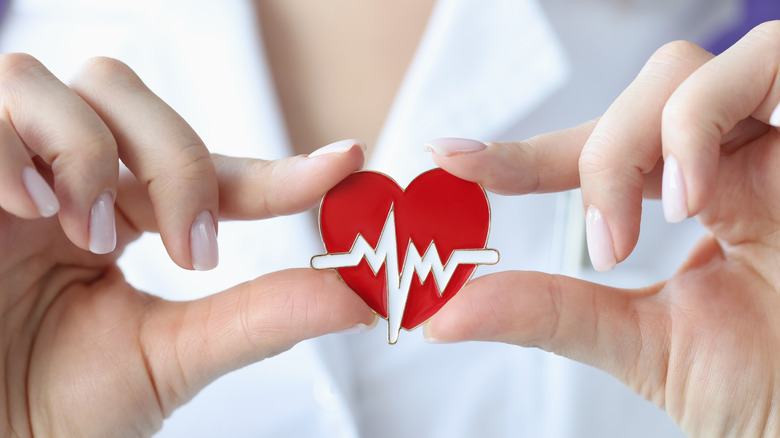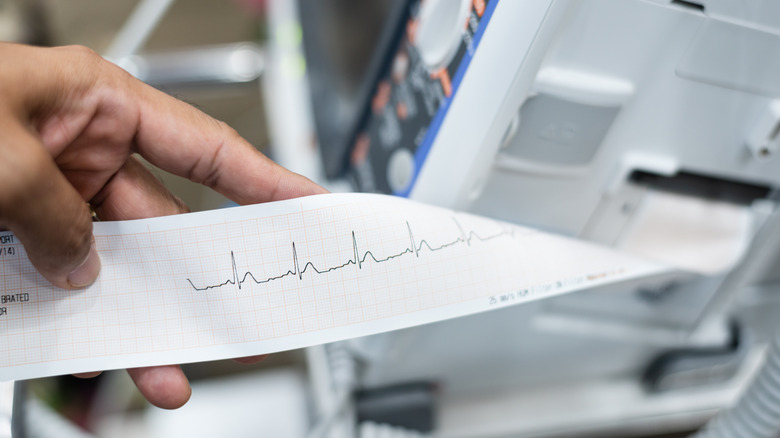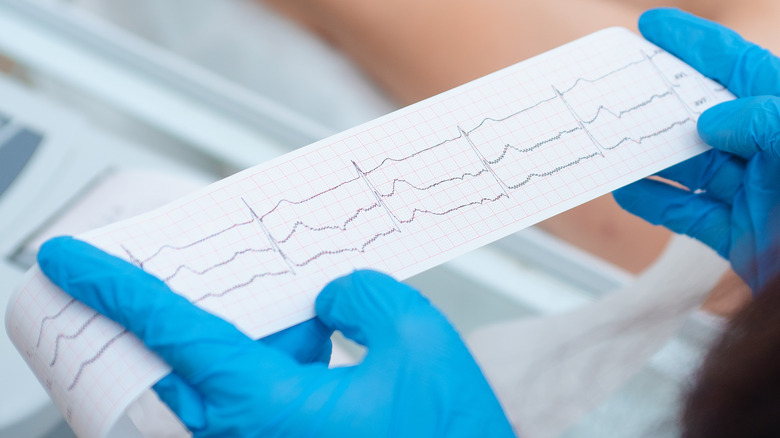What Happens To Your Body During An EKG Test?
Thanks to television shows like "Scrubs" and "General Hospital," many of us have heard of the acronyms EKG and ECG, both of which stand for "electrocardiogram." An EKG is a simple but powerful non-invasive test that detects and records the electrical signals of your heart (via Mayo Clinic). It offers doctors insight into the health of your heart, as well as factors like heart rate, heart rhythm, blood and oxygen supply flow, and structural integrity. EKG tests can even show evidence of a previous heart attack or if you're having a heart attack, and the extent of the damage.
Since EKG equipment is standard, the test can typically be run in either a doctor's office or at the hospital. It is often performed by a nurse or technician, and you may be asked to change into a gown so the electrodes can be applied to your body. Since the electrodes adhere to the skin via round adhesive pads, the skin may need to be shaved prior to running the test.
What to expect during an EKG test
An EKG generally follows a standard protocol. The patient lies flat on a table or bed, and the technician or nurse then adheres 10 electrodes to the chest, arms, and legs (via WebMD). The total duration of the test is about 5-10 minutes, including the time it takes to place the electrodes on the body. Once the test is complete, the technician removes the electrodes.
Because the electrodes simply monitor the electrical signals your heart creates and don't actually send any electricity into the body, the procedure is painless and generally free of discomfort (via Johns Hopkins Medicine). The most common discomfort associated with an EKG test is the removal of the adhesive pads. If they are left on the body too long, they can cause irritation to the skin. Proper and prompt removal by your technician should reduce the risk of any post-test discomfort. A rash or skin irritation where the adhesives are placed on the body are considered rare side effects, according to Mount Sinai. Certain risks may apply to those with pre-existing health conditions, meaning it's important to discuss any concerns with your doctor prior to the test.
Special considerations to take before an EKG test
According to WebMD, you'll want to avoid using oily skin creams or lotions prior to the EKG, as they can interfere with the adhesiveness of the electrode pads. While many medical tests require patients to fast ahead of time, it's not necessary for an EKG (via Johns Hopkins Medicine). Unless your doctor has indicated special preparatory instructions, it's safe to assume you won't need to take any precautions.
However, your doctor will likely want to know what medications and supplements you're taking, as this can affect your test results. Be sure to communicate any prescribed and over-the-counter medications, herbs, and supplements you're taking. Lastly, your doctor will want to know if you have a pacemaker. Note that stress tests use electrocardiogram monitors but are performed very differently than a standard EKG test (via Harvard Medical School). This test is usually performed on a treadmill under a doctor's supervision. It's important to consult with your doctor to determine how to best prepare for your specific test.



